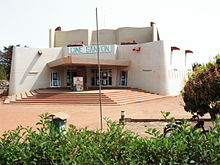- Culture of Burkina Faso
-
The culture of Burkina Faso in West Africa is also called the Burkinabé culture.
Two key elements of culture in Burkina Faso (a country once known as Upper Volta) are its indigenous masks and dancing. The masks used in this region of the western Sahel are made for rites of sacrifice to gods and animal spirits in the villages. Native dance, on the other hand, is employed to demonstrate the villagers' desire for blessings by the spirits......
Contents
Literature
Main article: Literature of Burkina FasoLiterature in Burkina Faso is based on the oral tradition, which remains important.[1] In 1934, during French occupation, Dim-Dolobsom Ouedraogo published his Maximes, pensées et devinettes mossi (Maximes, Thoughts and Riddles of the Mossi), a record of the oral history of the Mossi people.[1] The oral tradition continued to have an influence on Burkinabé writers in the post-independence Burkina Faso of the 1960s, such as Nazi Boni and Roger Nikiema.[2] The 1960s saw a growth in the number of playwrights being published.[1] Since the 1970s, literature has developed in Burkina Faso with many more writers being published.[3]
Theatre
Main article: Theatre of Burkina FasoTheatre of Burkina Faso combines traditional Burkinabé performance with the colonial influences and post-colonial efforts to educate rural people to produce a distinctive national theatre. Traditional ritual ceremonies of the many ethnic groups in Burkina Faso have long involved dancing with masks. Western-style theatre became common during colonial times, heavily influenced by French theatre. With independence came a new style of theatre inspired by forum theatre aimed at educating and entertaining Burkina Faso's rural people.
Cuisine
Main article: Cuisine of Burkina FasoCuisine of Burkina Faso, typically of west African cuisine, is based around staple foods of sorghum, millet, rice, maize, peanuts, potatoes, beans, yams and okra.[4]
Art and cinema
Main article: Cinema of Burkina FasoThe Popular Theatre in Ouagadougou, the capital of Burkina Faso, is a center of social and cultural events for the country. Ouagadougou, is a major hub of activity for those involved in African cinema, and hosts a Pan-African film festival every year called FESPACO, the Pan-African film and television Festival of Ouagadougou, which is a world-renowned affair. Culture and art are further displayed at Laongo, an area of exposed granites where artists from the entire world are invited to sculpt on the rock. [5] Idrissa Ouedraogo, probably the most commercially successful African director, is from Burkina Faso.
Music
Main article: Music of Burkina FasoReligion
While exact statistics on religion in Burkina Faso are not available and vary widely, the Government of Burkina Faso estimated in its most recent census (1996) that approximately 60 percent of the population practice Islam, and that the majority of this group belong to the Sunni branch, while remaining minorities adhere to the Shi'a branch, and significant numbers of Sunni Muslims identify with the Tijaniyah Sufi, or Salafi traditions.[6] The Government also estimated that 24 percent of the population maintains traditional indigenous beliefs, 17 percent practices Roman Catholicism, and 3 percent are members of various Protestant denominations.[6]
Holidays
Holidays[7] Date English Name January 1 New Year's Day January 3 Anniversary of the 1966 Coup d'État March 8 International Women's Day May 1 Labour Day August 4 Revolution Day August 5 Independence Day August 15 Assumption October 15 Anniversary of the 1987 coup d’état November 1 All Saints' Day December 11 Proclamation of the Republic December 25 Christmas References
- ^ a b c Salhi, Kamal (1999). Francophone Voices. Intellect Books. p. 37. ISBN 1902454030. http://books.google.co.uk/books?id=G9u9TeDegXMC.
- ^ Allan, Tuzyline Jita (1997). Women's Studies Quarterly: Teaching African Literatures in a Global Literary. Feminist Press. p. 86. ISBN 155861169X. http://books.google.co.uk/books?id=QD8TgZVWugYC.
- ^ Marchais, Julien (in French). Burkina Faso. Petit Futé. pp. 91–92. ISBN 2746916010. http://books.google.co.uk/books?id=6jsBLSzJWYsC.
- ^ "Oxfam's Cool Planet - Food in Burkina Faso". Oxfam. http://www.oxfam.org.uk/coolplanet/ontheline/explore/journey/burkina/food.htm. Retrieved 2008-05-21.
- ^ Burkina Faso (2006b). Sculptures de Laongo Burkina Faso Retrieved 04/12/ 2006 from [1]
- ^ a b International Religious Freedom Report 2007: Burkina Faso. United States Bureau of Democracy, Human Rights and Labor (September 14, 2007). This article incorporates text from this source, which is in the public domain.
- ^ "Burkina Faso Public Holidays 2008". World Travel Guide. http://www.worldtravelguide.net/country/45/public_holidays/Africa/Burkina-Faso.html. Retrieved 2008-06-06.
Culture of Africa Sovereign
states- Algeria
- Angola
- Benin
- Botswana
- Burkina Faso
- Burundi
- Cameroon
- Cape Verde
- Central African Republic
- Chad
- Comoros
- Democratic Republic of the Congo
- Republic of the Congo
- Côte d'Ivoire (Ivory Coast)
- Djibouti
- Egypt
- Equatorial Guinea
- Eritrea
- Ethiopia
- Gabon
- The Gambia
- Ghana
- Guinea
- Guinea-Bissau
- Kenya
- Lesotho
- Liberia
- Libya
- Madagascar
- Malawi
- Mali
- Mauritania
- Mauritius
- Morocco
- Mozambique
- Namibia
- Niger
- Nigeria
- Rwanda
- São Tomé and Príncipe
- Senegal
- Seychelles
- Sierra Leone
- Somalia
- South Africa
- South Sudan
- Sudan
- Swaziland
- Tanzania
- Togo
- Tunisia
- Uganda
- Zambia
- Zimbabwe
States with limited
recognition- Sahrawi Arab Democratic Republic
- Somaliland
Dependencies and
other territories- Canary Islands / Ceuta / Melilla / Plazas de soberanía (Spain)
- Madeira (Portugal)
- Mayotte / Réunion (France)
- Saint Helena / Ascension Island / Tristan da Cunha (United Kingdom)
- Western Sahara
 Burkina Faso topics
Burkina Faso topicsHistory Geography Politics President · Prime Minister · Government · Political parties · Elections · Constitution · Foreign relations · Military · Law enforcement · Human rights (LGBT rights)Economy Agriculture · Energy · Tourism · West African CFA franc · Communications · Companies · Mining · Transport · Trade unions · HealthDemographics Culture Categories:- Burkinabé culture
Wikimedia Foundation. 2010.

